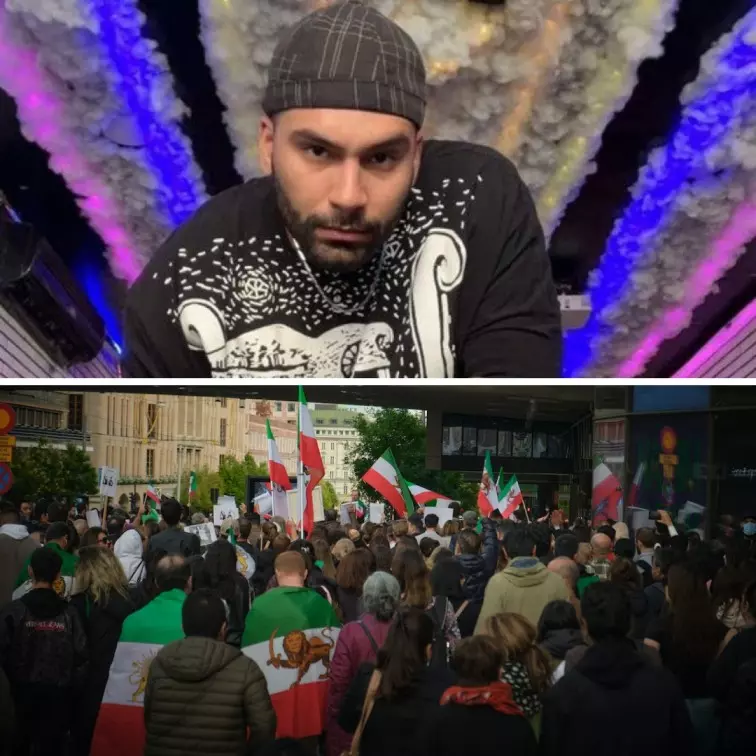
Image Credits: Unsplash, Twitter/IHRights (Representational)
Iran Conducts First Known Execution Over Ongoing Protests, Says More To Follow
Writer: Hardik Bhardwaj
He is a student of SIMC, who is organized and able to meet deadlines in a fast-paced environment.
Others/World, 8 Dec 2022 12:33 PM GMT
Editor : Jayali Wavhal |
She writes about gender issues, human interest, and environment.
Creatives : Jayali Wavhal
She writes about gender issues, human interest, and environment.
Shekari was detained on several counts, including brandishing a weapon to kill and cause panic, endangering the safety and freedom of others, and was charged with hostility against God under Iranian Sharia Law.
In a recent development in Iran's raging nationwide protests, the government announced its first execution, that of Mohsen Shekari, a human-rights activist convicted in November for allegedly wounding a military officer.
Shekari was booked under multiple charges, including intentionally wounding an officer with a weapon, blocking the street, brandishing a weapon to kill and incite terror, and compromising the freedom and security of people. He was eventually charged under Iran's Sharia Law for enmity against God.
More Executions To Follow
Earlier, Iran saw the execution of five additional defendants for the murder of a Basij security force volunteer in Iran. Basij is a state-approved volunteer group with ties to Iran's potent Islamic Revolutionary Guard Corps. According to BBC, ten more people have been found guilty of enmity against God or corruption on Earth and given the death penalty in connection with the protests.
According to human rights organisation Amnesty International, at least 21 individuals face the death penalty due to what they dubbed as fake trials intended to terrify those taking part in the public revolt that has shaken Iran.
Iranian Human Rights director Mahmood Amiry-Moghaddam tweeted that unless Iranian authorities face immediate practical consequences internationally, executions of demonstrators are likely to become a daily occurrence.
Iranian authorities have executed a protester, sentenced to death in show trials without any due process.His charges: Moharebeh" for closing the street and injuring an officer with a knife. His name is #MohsenShekari - He was hanged early this morning. #IranRevolution2022
— Mahmood Amiry-Moghaddam (@iranhr) December 8, 2022
Biggest Protest In Iran Since 1979
Protests in Iran erupted after Mahsa Amini, a 22-year-old woman who morality police had arrested for reportedly wearing her hijab, or headscarf, "improperly," passed away while she was still in their custody in September. What followed was a women-led protest that extended itself to 160 cities across all 31 provinces of the nation and has become the most significant threat to the Islamic Republic since the 1979 revolution.
In retaliation, the government began its ruthless crackdown on the protestors, while parliamentarians advocated for hefty sentences to try and quash the protests. Iran claims that these protests were started by the US, its arch-enemy, and its allies, including Israel and Britain.
The Iranian Supreme Leader Ayatollah Ali Khamenei's estranged sister Badri Hosseini Khamenei published a letter on December 6 in response to the savagery of the crackdown. In the letter, she declared her opposition to her brother's actions. She also expressed sympathy with mothers who have lost loved ones due to atrocities by the Islam Republic over the past 40 years. Farideh Moradkhani, the niece of the supreme leader, was also detained a week ago after publicly ridiculing the autocratic rule in Iran.
According to the Human Rights Activists News Agency (HRANA), at least 475 protestors have died, and 18,240 have been imprisoned thus far. Around 61 security personnel deaths have also been recorded.
Also Read: Niece Of Iran's Supreme Leader Asks Foreign Nations To Cut Ties With Iran
 All section
All section













